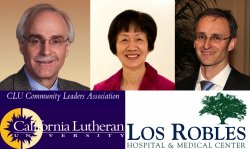2nd Annual Cell Biology Symposium: Frontiers in Cancer Biology
In The Crosshairs: Targeting Cancer
We are approaching a renaissance in cellular and molecular biology, genetic sequencing, new techniques, and better understandings of the workings of cells. This new-found appreciation for cells and how they work is being used to specifically target defective pathways in cancer cells. Come learn how researchers in the laboratory and clinicians are developing new ways to attack cancer.
The symposium will include a continental breakfast and seminars by three speakers on their fields of interest in cancer biology and cancer treatment. Each seminar includes time for questions.
8 a.m. Continental breakfast and student poster session
9 a.m. Dr. Paul Miller, M.D.
9:50 a.m. Coffee Break
10 a.m. Amy S. Lee, Ph.D.
10:50 a.m. Coffee Break
11 a.m. Marcin Kortylewski, Ph.D.
11:50 a.m. Thank you to speakers, closing remarks
About the speakers:
After earning degrees in chemistry, psychology and chemical engineering at the University of Kansas, Dr. Paul Miller was briefly a research engineer in the aerospace field in Southern California, working on the development of the space shuttle. Miller then worked in a genetics research lab at the University of Kansas, where he later attended medical school and completed training in radiation oncology. Board-certified by the American College of Radiology, Dr. Miller has been an assistant clinical professor in the Department of Radiation Oncology at UCLA School of Medicine since 1990. He has participated in multiple clinical trials through the years and previously held the position of principal investigator at Los Robles Regional Medical Center in Thousand Oaks, for the Southwest Oncology Group, a national cancer research organization funded by the National Cancer Institute in cooperation with UCLA. He has published research on high-grade brain tumors, and has actively participated in studies on breast cancer, lung cancer and brain tumors. Miller has used his engineering background to spearhead the advancement of optimal technologies for the treatment of cancer patients within this group. He is a member of the American Medical Association (AMA), the American Society of Therapeutic Radiology and Oncology (ASTRO) and the American Society of Clinical Oncology (ASCO). He practices at North Oaks Radiation Oncology Medical Center in Thousand Oaks.
Amy S. Lee, Ph.D., is Associate Director for Basic Research and Professor of Biochemistry and Molecular Biology at the University of Southern California Norris Comprehensive Cancer Center. Lee obtained her B.A. from the University of California, Berkeley, and her Ph.D. from the California Institute of Technology in Pasadena. Lee holds the Judy and Larry Freeman Cosmetics Chair in Basic Science in Cancer Research at USC. Her research focuses on the mammalian stress response and molecular chaperones. Her laboratory was the first to clone the genes coding for a set of endoplasmic reticulum (ER) stress inducible glucose regulated proteins (GRPs) and has made numerous discoveries in understanding how these genes are regulated and their role in development and human diseases. For example, Lee’s laboratory established that GRP78 is a major contributor for tumorigenesis, metastatic growth and drug resistance. Through creation of conditional knockout mouse models of GRP78, her laboratory provides direct proof that GRP78 is required for breast, prostate and leukemia tumorigenesis and that a partial reduction of GRP78, while having no effect on normal organ function, is sufficient to halt the progression of these cancers in vivo. GRP78 is now recognized as a novel cancer therapeutic target with dual function in tumor progression as well as tumor angiogenesis and a novel prognostic marker for tumor virulence and disease recurrence. For her research achievements, Dr. Lee received the MERIT Award from the National Cancer Institute in 1988. In recognition of her pioneering work on ER stress and its impact on cell and cancer biology, she was elected Fellow of the American Association for the Advancement of Sciences (AAAS) in 2006. She was the recipient of the Chinese-American Faculty Association Achievement Award in 2008. Lee chaired a major symposium on the Stress Response in Cancer at the American Association for Cancer Research (AACR) annual meeting in 2011.
Marcin Kortylewski, Ph.D., from City of Hope will give a research seminar on his work in delivering siRNA therapeutics to cancer cells or immune cells via a TLR9 conjugated molecule. His studies either target tumor cells directly or target the tumor-permissive immune cells. Kortylewski is studying the intracellular processing of CpG-siRNA to identify molecular mechanisms needed to make the silencing of cancer-causing genes more effective. As a part of this effort, he is broadening his understanding of TLR9, the protein responsible for recognizing pathogens and infectious agents like cancer cells, and then activating the body’s immune cells against those pathogens. In mouse studies, Kortylewski demonstrated that the TLR9 protein helps the foreign siRNA therapeutic escape endosomes –which are responsible for moving and sorting proteins throughout the body, specifically plasma – and reach cytoplasm. There, the therapeutic silences overexpressed Stat3 proteins. Dr. Kortylewski now seeks to verify whether TLR9 perform the same function for siRNA in human immune and cancer cells. The results of this investigation will ultimately help improve the Cpg-siRNA therapeutic for clinical use.
Sponsored By
Los Robles Medical Center, Community Leaders AssociationContact
Chad Barber
cbarber@callutheran.edu
805-493-3873
